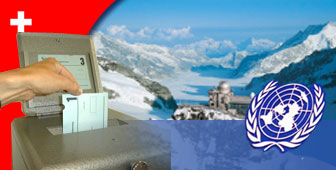Swiss poised to vote yes to UN membership

With almost all the ballots counted, Switzerland looks set to become the 190th member of United Nations. The vote is almost evenly split among the country's cantons and two - Zurich and Vaud - will determine the outcome.
By early afternoon, exit polls showed 55 per cent popular support for UN membership, while among the cantons, the “yes” vote was ahead by a single canton.
The vote is too close to call, but the no campaign – led by the rightwing populist Christoph Blocher – is seen as being on the defensive, unlike in 1986, when the measure was soundly defeated.
Then, the yes camp found itself selling the merits of membership to a sceptical public; this time it is the “nos” who are at pains to point out why Switzerland should be the only state – bar the Vatican – to remain outside the world body.
Membership is backed by three of the four main political parties, as well as business, and the organisation representing Swiss expatriates. They threw their weight behind joining the world body after a cross-party committee collected the necessary number of signatures for nationwide ballot.
Carlo Moos, a historian at Zurich University, told swissinfo that the yes camp had learned a few lessons since 1986, when two-thirds of voters rejected membership.
“Unlike their opponents, the [supporters] of the UN in 1986 were constantly on the defensive. They limited their efforts to defusing the opposing arguments and explaining how useful it would be for Switzerland to join… effectively leaving their opponents in possession of the field.”
Neutrality
The no campaign – comprised chiefly of the rightwing Swiss People’s Party and the Campaign for an Independent and Neutral Switzerland (CINS) – has made the issue of neutrality the key pillar of their campaign.
By joining the UN, they argue, Switzerland would suffer an unacceptable loss of sovereignty. They say the country would be forced to do the bidding of the UN Security Council, which could force Swiss conscripts to take up arms in foreign conflicts.
The government and most constitutional and legal experts have dismissed the suggestion as scare mongering. They say that, at most, Switzerland would be required to impose non-military sanctions against other countries.
Supporters of membership add that Switzerland has in any case religiously followed the UN sanctions regime since 1990, joining embargoes against Iraq, the rump Yugoslavia, Unita rebels in Angola, the Taliban regime in Afghanistan, and Sierra Leone and Liberia.
Cost of membership
Blocher has also warned of rising costs for Switzerland if it decides to become a UN member: “We will have to contribute towards UN peace keeping missions and for development aid. It is a bottomless pit.”
The yes camp retorts that Switzerland is already a member of many UN agencies and forks out about SFr500 million ($294 million) every year, but sees none of the benefits of full membership.
“The time has come for Switzerland not only to have obligations within the UN system, but also a right to take decisions,” is the view of the Swiss foreign minister, Joseph Deiss.
Humanitarian tradition
Supporters of membership say that Switzerland and the UN share the same values and interests: Switzerland has a long humanitarian tradition and would be compatible with what they describe as the only organisation which can combat hunger, poverty, injustice and violence on a global level.
They say the world body is also an important economic factor, particularly for Geneva which is the seat of the UN’s European headquarters.
Opinion polls predict a close result. A poll conducted in mid-February showed that 54 per cent of Swiss were planning to vote in favour, with 37 per cent against and nine undecided.
Under the Swiss system, the vote must be carried by both a popular majority nationwide as well as a majority of Switzerland’s 26 cantons (states).
by Denise Kalette and Urs Geiser

In compliance with the JTI standards
More: SWI swissinfo.ch certified by the Journalism Trust Initiative

You can find an overview of ongoing debates with our journalists here. Please join us!
If you want to start a conversation about a topic raised in this article or want to report factual errors, email us at english@swissinfo.ch.